|
|
|
Sort Order |
|
|
|
Items / Page
|
|
|
|
|
|
|
| Srl | Item |
| 1 |
ID:
189945
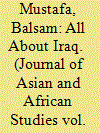

|
|
|
|
|
| Summary/Abstract |
This paper analyses five main slogans and chants performed during the first 3 months of Iraq’s 2019 Tishreen [October] protests. It aims to trace their origin to examine the transformation in the narratives created by each version. Drawing on a social approach to narrative and a social semiotic multimodal approach to communication, I treat slogans and chants as an evolving genre and performance, capable of triggering, constructing, and negotiating a different set of narratives in each adaptation. Such narratives arguably determine their impact. Unlike earlier versions, Tishreen chants and slogans succeeded in conjuring up collective and cross-sectarian narratives that could challenge master political narratives and heighten an Iraqi identity in the first place. It would, therefore, be hard to erase them from memory.
|
|
|
|
|
|
|
|
|
|
|
|
|
|
|
|
| 2 |
ID:
144173
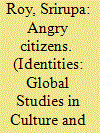

|
|
|
|
|
| Summary/Abstract |
This article examines the emergence of the angry citizen as a legitimate political actor in post-colonial Indian democracy. Approaching such ‘civic anger’ as a historically constituted and socio-politically embedded formation rather than as a subjectively and individually experienced feeling, I show that the rise of the angry citizen was linked to the consolidation of a distinctive politics of curative democracy in the ‘long 1970s’. The lineages of the civic anger of twenty-first century India may be traced to this older formation of curative democracy. The point here is not to offer a chronological revision of the origins of ‘new India’, but to consider the generalisable political implications of the idea of curative democracy, and to identify the distinctive forms of political agency that are associated with the call to cure, reform or renew democracy.
|
|
|
|
|
|
|
|
|
|
|
|
|
|
|
|
| 3 |
ID:
152241
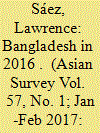

|
|
|
|
|
| Summary/Abstract |
The year 2016 was challenging for Bangladesh. Although there are promising signs of a transition toward upper lower-income status, there is sufficient political instability at the margins to warrant concern. The capstone political event was the July terrorist attack in Dhaka, which many feared might represent the first clear metastasized imprint of the Islamic State (ISIS) in Bangladesh.
|
|
|
|
|
|
|
|
|
|
|
|
|
|
|
|
| 4 |
ID:
193472
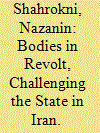

|
|
|
|
|
| Summary/Abstract |
The protests that erupted across Iran in 2022 after the death of a woman arrested for noncompliance with a headscarf requirement were not only about religious dress codes. They were a culmination of years of growing discontent over broader questions involving the place of women in the Islamic Republic and other grievances about the reach of an overbearing state and perceived social and political injustices. The erosion of civil society has made it difficult to sustain the protests’ momentum, as the state moves to co-opt businesses and the public into enforcing its decrees, but the uprising is part of a longer-term, nonlinear process of dissent-driven change in Iran.
|
|
|
|
|
|
|
|
|
|
|
|
|
|
|
|
| 5 |
ID:
137917
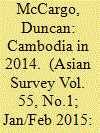

|
|
|
|
|
| Summary/Abstract |
During 2014, Cambodia moved from violent confrontation between government and opposition forces to an uneasy compromise. The turning point came in July, when opposition legislators agreed to take their seats in the National Assembly, which they had boycotted. The long-ruling Cambodian People’s Party worked to polish its tarnished image.
|
|
|
|
|
|
|
|
|
|
|
|
|
|
|
|
| 6 |
ID:
167288
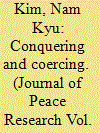

|
|
|
|
|
| Summary/Abstract |
Recent research finds an association between nonviolent protests and democratic transitions. However, existing scholarship either does not specify the pathways through which nonviolent protests bring about democratization or conduct systematic empirical analyses demonstrating that the specified pathways are operative. This article proposes four pathways through which nonviolent anti-regime protests encourage democratic transitions, emphasizing their ability to directly conquer or indirectly coerce such transitions. Most simply, they can conquer democratic reforms by directly overthrowing authoritarian regimes and installing democracies. They can also coerce democratic reforms through three additional pathways. Nonviolent anti-regime protests can coerce incumbent elites into democratic reforms by threatening the survival of authoritarian regimes. They also increase the likelihood of elite splits, which promote negotiated democratic reforms. Finally, they encourage leadership change within the existing authoritarian regime. Following leadership change, nonviolent movements remain mobilized and are able to coerce democratic concessions from the regime’s new leaders. Our within-regime analyses provide robust empirical support for each pathway. We show that nonviolent anti-regime protests conquer democratic reforms by ousting autocratic regimes and replacing them with democracies. Nonviolent anti-regime protests also coerce elites into democratic reforms by threatening regime and leader survival. These findings highlight the importance of protest goals and tactics and also that nonviolent anti-regime protests have both direct and indirect effects on democratization.
|
|
|
|
|
|
|
|
|
|
|
|
|
|
|
|
| 7 |
ID:
189713


|
|
|
|
|
| Summary/Abstract |
Amid an economic meltdown in 2022, a nonviolent citizens movement in Sri Lanka ousted Prime Minister Mahinda Rajapaksa and President Gotabaya Rajapaksa, brothers from a family that had dominated national politics since 2005. But Parliament filled the presidential vacancy with Ranil Wickremesinghe, a six-time former prime minister seen as a proxy for his predecessors. After a draconian crackdown on protesters, the streets have quieted. But the country’s underlying economic and political crisis, which has roots in the early postcolonial period and the civil war, and was worsened by the Rajapaksas’ autocratic misrule, persists. The new administration has avoided the systemic change demanded by protesters.
|
|
|
|
|
|
|
|
|
|
|
|
|
|
|
|
| 8 |
ID:
188999
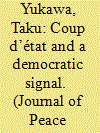

|
|
|
|
|
| Summary/Abstract |
What connection exists between protests and coup attempts? Although recent studies have revealed that the former incites the latter, they generally do not consider international factors. We contend that post-Cold War nonviolent protests have promoted coup attempts. With sentiment in the international community turning against coups following the end of the Cold War, coup organizers have had to portray their actions as democratic. Launching a coup attempt during ongoing nonviolent protests became a convincing method to prove democratic bona fides. This is because the international community favors nonviolence, and it signals that the emerging regime will not have extreme preferences and will keep order. Conversely, the international community does not regard violent protests as legitimate, and staging a coup attempt during violent protests will not enable a military to claim legitimacy. This argument is tested through statistical analysis and by using the 2011 Egyptian coup as a case study. As expected, the results indicate that the impact of protests on coup attempts varies depending on (1) whether those protests are violent or nonviolent, and on (2) the period. Specifically, only the nonviolent protests in the post-Cold War era prompt coup attempts meaningfully.
|
|
|
|
|
|
|
|
|
|
|
|
|
|
|
|
| 9 |
ID:
179339
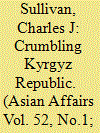

|
|
|
|
|
| Summary/Abstract |
Although Kyrgyzstan has recently withstood two coup d'états (or so-called “revolutions”) and a bout of ethnic violence, the politicization of the legal system by successive presidents portends a troublesome future. The 2017 transition from Almazbek Atambaev to Sooronbai Jeenbekov gave way to the former's arrest and imprisonment. A series of other prior arrests and incarcerations of (former) parliamentarians indicate that Kyrgyzstan's presidents are regularly manipulating the legal system to persecute and neutralize their rivals. This article posits that the repetitive rupturing of legal institutions will usher in an era of heightened illiberalism, elite uncertainty, and the further discrediting of the political system, thereby placing the state on the brink of failure. The mass uprising in response to the October 2020 parliamentary electoral results and most recent coup d'état indicate that the prospects of the Kyrgyz Republic suffering a collapse are real.
|
|
|
|
|
|
|
|
|
|
|
|
|
|
|
|
| 10 |
ID:
189702
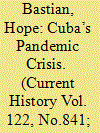

|
|
|
|
|
| Summary/Abstract |
The COVID-19 pandemic has compounded a crisis of legitimacy for Cuba’s first leader of the post-Castro era. The initial pandemic response, relying on lockdowns, was effective but worsened the country’s economic problems. Then a wave of infections driven by a new variant of the virus overwhelmed the celebrated public health system. Instead of acknowledging citizens’ sacrifices and grievances, the government has sought to discredit dissent. But there have been protests of unprecedented scale, and hundreds of thousands of Cubans have left the country since the borders reopened in late 2021.
|
|
|
|
|
|
|
|
|
|
|
|
|
|
|
|
| 11 |
ID:
178394
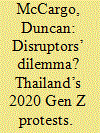

|
|
|
|
|
| Summary/Abstract |
This article offers a preliminary analysis of the hundreds of youth-inspired mass protests staged in Thailand during 2020. It argues that while calling for reforms and flirting with revolutionary rhetoric, the protestors lacked a clear programmatic agenda and were primarily engaged in disrupting dominant narratives about the country’s politics, especially in relation to the previously taboo question of the political role of the monarchy. Despite the ad hoc and sometimes incoherent nature of the protests, the students mounted a dramatic challenge to Thailand’s ruling elite. Ultimately, the conflict exemplified a generational divide: people from Generation Z, aged under 25, have radically different understandings of power, deference and legitimacy from older population groups. Whatever happens to the protest movement in the short term, the demonstrators have made a decisive break with the old social consensus that existed during the long reign of the late King Bhumibol (1946–2016).
|
|
|
|
|
|
|
|
|
|
|
|
|
|
|
|
| 12 |
ID:
172134
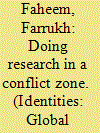

|
|
|
|
|
| Summary/Abstract |
This paper argues that in conflict zones like Jammu and Kashmir, the embodied stories of Kashmiris punctuate the past, often silenced by dominant Indian narratives. Narratives about certain key political events in the region's past co-exist with other forms of memory. Kashmiris weave these stories to make sense of the present, build connections to the past, and stake claims for the future. They build and nourish an archive based on lived experience, keeping a record of past wrongs. Novels, anecdotes and underground literature form part of this embodied archive, and provide a resource for recovering stories that remain silent in institutional archives which serve the interests of power. These interests are visible through restrictions on access to institutional archives, and demonstrate the effects of power and the overall politics of archives.
|
|
|
|
|
|
|
|
|
|
|
|
|
|
|
|
| 13 |
ID:
105546


|
|
|
| 14 |
ID:
187637


|
|
|
| 15 |
ID:
087805


|
|
|
| 16 |
ID:
162094
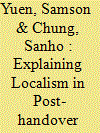

|
|
|
|
|
| Summary/Abstract |
The pro-democracy movement in post-handover Hong Kong had long been an intense struggle between the hybrid regime and prodemocracy civil society. Since the early 2010s, a new political force, broadly known as the localists, has entered the political domain through a series of protest events and elections. However, just as they gained a foothold in politics, the hybrid regime swiftly moved in to clamp down on the nascent movement to keep them out of the political system. What explains the ebbs and flows of Hong Kong’s localist movement? This essay posits that localism is not an inevitable product of the macro-structural socio-political process, but an amalgam of ideas and action logics assembled sequentially through events and discursive constructions. We argue that localism first emerged through the interplay between antimainlandisation protests and both online and intellectual discourse, and officially ascended to the political stage after the Umbrella Movement. Despite their meteoric rise, localists’ militant actions have allowed the hybrid regime to marginalise the nascent force through legal and non-legal repression, which has in turn created a “divided structure of contestation” among the opposition.
|
|
|
|
|
|
|
|
|
|
|
|
|
|
|
|
| 17 |
ID:
170200


|
|
|
|
|
| Summary/Abstract |
Based on their quantitative survey of democracy protests from 1989 to 2011, Dawn Brancati and Adrian Lucardi conclude that diffusion of such protests is the exception, not the rule; that domestic factors rather than international diffusion are key in determining if diffusion occurs and that their findings call into serious question the received wisdom about democratic diffusion. We have several problems with their analysis. First, no serious scholar of diffusion has claimed that the diffusion of subversive innovations supporting democracy is common or frequent, given the difficulties involved. Their conclusion that such diffusion is not common thus echoes, rather than challenges those of many scholars of diffusion. Second, their conclusion that domestic factors are primary in rejecting or sometimes supporting democratic change is also unsurprising. Virtually every empirical account and every theory of cross-national diffusion identify variation in domestic receptivity to change as a key element in determining if diffusion occurs, and its limits. Finally, we question the authors’ decision to limit their analysis of diffusion to protests. Innovative challenges to authoritarian rule have taken many additional forms, including roundtables and legal challenges, as well as voter registration and get out the vote drives, agreements among opposition parties, work by civil society organizations, and participation in transnational networks of democracy activists, in addition to protests. Democracy protests are in fact a small and perhaps unrepresentative part of challenges to authoritarian rule; they are likely the result of a series of innovative actions that are hard to quantify and hard to trace, and for this reason are missing from Brancatii and Lucardi’s analysis. Their analysis, therefore, does not challenge the accepted wisdom on diffusion, but, in fact, lends partial support to its conclusions, support that is limited by the kinds of data collected and the authors’ understanding of both innovation and diffusion.
|
|
|
|
|
|
|
|
|
|
|
|
|
|
|
|
| 18 |
ID:
178647


|
|
|
|
|
| Summary/Abstract |
Research often fails to account for the specific pathways by which climatic factors can cause social unrest. One challenge lies in understanding the distinct effects of food insecurity and water insecurity – which we term ‘staple insecurities’ – while accounting for their interrelated nature, especially at high-resolution spatio-temporal scales. To unpack these dynamics, we leverage geolocated Twitter data across urban areas in Kenya and deploy a supervised machine learning approach to separately identify geolocated tweets concerning food and water insecurity, in both English and Swahili. The data are then aggregated to create daily measures of food and water insecurity for standardized grid-cells to examine how perceived food insecurity moderates and/or reinforces perceived water insecurity’s impacts on social unrest, and vice versa. Our findings suggest that food and water insecurities’ respective effects should be interpreted as mutually reinforcing – in compelling citizens to take to the streets – rather than as independent. Those concerned with climate change’s impact on conflict should hence endeavor to jointly account for both forms of insecurity, and their interactive effects.
|
|
|
|
|
|
|
|
|
|
|
|
|
|
|
|
| 19 |
ID:
187431


|
|
|
|
|
| Summary/Abstract |
Since its establishment as an independent state, Israel has witnessed waves of protests, sometimes violence, from the Haredi (ultraorthodox) community. Focusing on clashes between Haredi protesters and the police from 2000 onward, this study suggests a new theoretical explanation for Haredi protests and violent activities. By using a mixture of the following three major theories—primordial, constructivism, and contingency—the article provides a new model for analyzing Haredi patterns of confrontation with the Israeli authorities. It concludes, inter alia, that the Haredi community is a permanent passive protest movement that responds, usually immediately, to official initiatives to change the status quo involving the state, politics, society, and religion in Israel.
|
|
|
|
|
|
|
|
|
|
|
|
|
|
|
|
| 20 |
ID:
178395
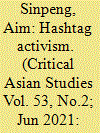

|
|
|
|
|
| Summary/Abstract |
The Thai 2020 anti-government protests were the first large-scale pro-democracy protests in Thailand mediated on Twitter. How has Twitter been used by anti-government supporters and to what effect? This article examines the use of hashtags by activists during the early stages of the Thai 2020 anti-government protests. Using an original dataset of 27,233 Twitter data points drawn from the #FreeYouth (FYM; #เยาวชนปลดแอก) campaign, the article argues that Twitter was used primarily to build collective narratives and disseminate movement information, rather than to mobilize offline protest activities. The key topic conversations within the Free Youth networks focus on discontent towards the government and demands for democracy, suggesting that Twitter was central to mobilizing pro-democracy collective action frames. The article further argues that the Free Youth networks on Twitter were loosely connected through community clusters of weak ties, not tight crowds. The challenge for FYM activists going forward is to support ties across its online networks that will strengthen over time, or risk becoming an ephemeral network of convenience that can only be mobilized on an ad hoc basis.
|
|
|
|
|
|
|
|
|
|
|
|
|
|
|
|
|
|
|
|
|